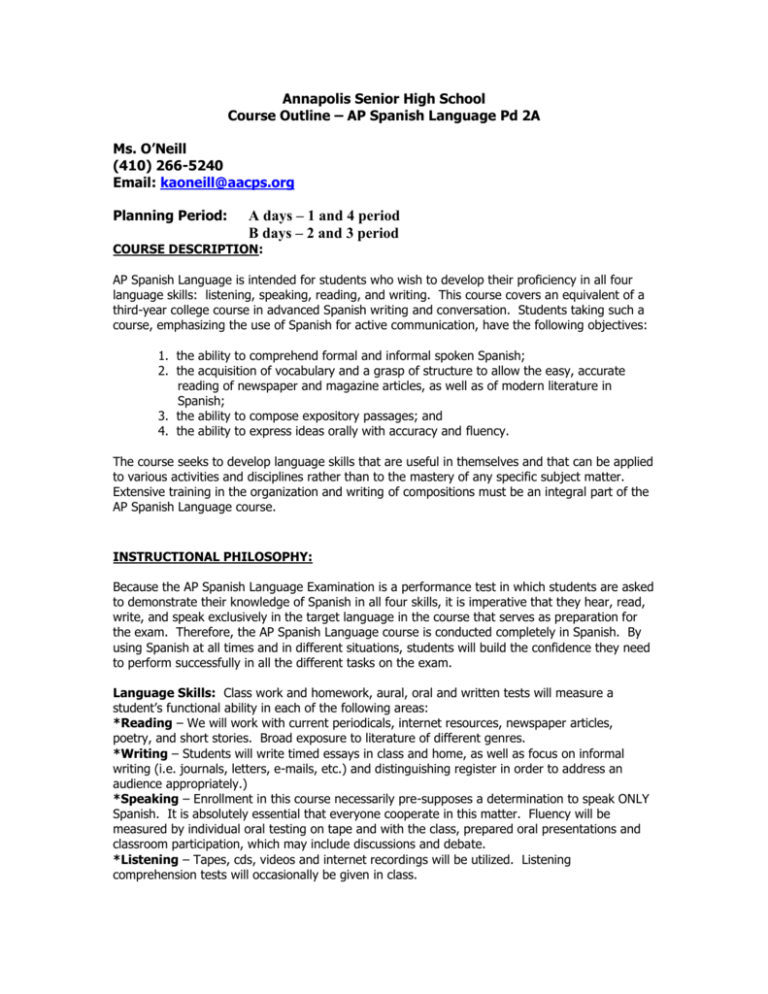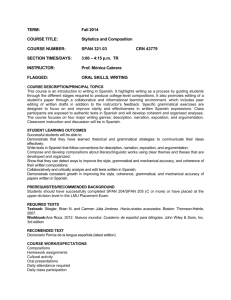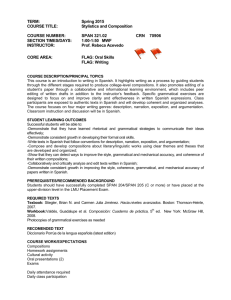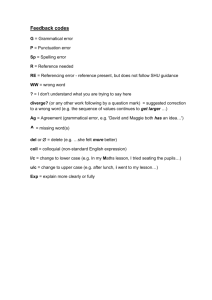
Annapolis Senior High School
Course Outline – AP Spanish Language Pd 2A
Ms. O’Neill
(410) 266-5240
Email: kaoneill@aacps.org
Planning Period:
A days – 1 and 4 period
B days – 2 and 3 period
COURSE DESCRIPTION:
AP Spanish Language is intended for students who wish to develop their proficiency in all four
language skills: listening, speaking, reading, and writing. This course covers an equivalent of a
third-year college course in advanced Spanish writing and conversation. Students taking such a
course, emphasizing the use of Spanish for active communication, have the following objectives:
1. the ability to comprehend formal and informal spoken Spanish;
2. the acquisition of vocabulary and a grasp of structure to allow the easy, accurate
reading of newspaper and magazine articles, as well as of modern literature in
Spanish;
3. the ability to compose expository passages; and
4. the ability to express ideas orally with accuracy and fluency.
The course seeks to develop language skills that are useful in themselves and that can be applied
to various activities and disciplines rather than to the mastery of any specific subject matter.
Extensive training in the organization and writing of compositions must be an integral part of the
AP Spanish Language course.
INSTRUCTIONAL PHILOSOPHY:
Because the AP Spanish Language Examination is a performance test in which students are asked
to demonstrate their knowledge of Spanish in all four skills, it is imperative that they hear, read,
write, and speak exclusively in the target language in the course that serves as preparation for
the exam. Therefore, the AP Spanish Language course is conducted completely in Spanish. By
using Spanish at all times and in different situations, students will build the confidence they need
to perform successfully in all the different tasks on the exam.
Language Skills: Class work and homework, aural, oral and written tests will measure a
student’s functional ability in each of the following areas:
*Reading – We will work with current periodicals, internet resources, newspaper articles,
poetry, and short stories. Broad exposure to literature of different genres.
*Writing – Students will write timed essays in class and home, as well as focus on informal
writing (i.e. journals, letters, e-mails, etc.) and distinguishing register in order to address an
audience appropriately.)
*Speaking – Enrollment in this course necessarily pre-supposes a determination to speak ONLY
Spanish. It is absolutely essential that everyone cooperate in this matter. Fluency will be
measured by individual oral testing on tape and with the class, prepared oral presentations and
classroom participation, which may include discussions and debate.
*Listening – Tapes, cds, videos and internet recordings will be utilized. Listening
comprehension tests will occasionally be given in class.
*Grammar – A strong grammar base is imperative for success in AP Spanish. Each chapter of
the text is separated by grammatical themes. Quizzes and tests will be given on a regular basis.
*Vocabulary- Thematic instruction/review of necessary vocabulary for common social and
academic topics, literary selections, idiomatic expressions, commonly confused words.
*Culture and History- Discussion and research of the cultural, geographical, and historical
references which form the background for the literary works read; daily discussion of “What’s
new in the world?” to address current events.
*A.P. Practice – Exercises, activities, timed-writings and readings, and practice tests specifically
modeled after the actual A.P. Exam.
The AP Spanish Language Examination:
The AP Exam will be held in May. This is the natural culmination of the course. The exam is not
based on specific course content but instead attempts to evaluate levels of performance in the
use of the language.
Overview of Class Activities:
small group discussions
informal writing assignments such as journal writing, e-mails, letter writing, poetry, short
essay
simulated phone conversations using recording equipment
timed readings
reading from authentic sources
formal writing incorporating integrated skills
peer review and editing
debates
paragraph completion with and without root words
practice listening exercises from authentic listening resources as cited
listening exercises to include: short and long dialogues, short and long narratives, cloze
activities
review of grammatical structures and vocabulary
activities to prepare for the AP Spanish Language Exam
sequencing of events from selected readings
conduct web research
formal/informal oral presentations such as current events, personal experiences, etc.
web search and interpretation of editorial cartoons from Hispanic newspapers
textual analysis
interview a character from selected reading
write a new ending for selected reading
extend a selected reading by creating a dialogue
Grading policy
Students will receive grade sheets every two weeks to monitor their progress.
Per the county’s policy, semester averages are calculated via percentages not
letter grades.
A student may receive a zero (0%) if he or she refuses to do an assignment or
attempts to abuse the redo opportunity. When a student turns in assignments that
do not meet the standard, he or she will receive a grade no lower than 50%.
Homework will count no more than 5% of the marking period.
Homework:
5%
Assessments: 95%
(tests/quizzes/projects/presentations/graded assignments)
Assignments that can be made up will be indicated in PowerTeacher with the
numerical percentage 0.1. Those assignments that cannot be made up would be
indicated by simply a zero (0%).
All work should be completed and handed in on time. If an assignment is turned
in late, 1% will be penalized for each class period it is late.
Re-do’s may only take place if all assignments up to that point are complete and
you must come for remediation prior to any re-do. County benchmarks are not
eligible for re-do.
*Late, missing or re-do work is due two weeks before the end of each quarter*
1st MP- Friday October 14 (last help day October 12)
2nd MP- Friday January 6 (last help day January 4)
3rd MP Friday March 6 (last help day March 4)
4th MP Friday May 24 (last help day May 22)
*Seniors May 17(last help day May 15)*
*Grades will not be discussed during instructional time*
Classroom Expectations:
PBIS: Students need to show respect for themselves, for others, for learning, and for
property.
Daily attendance is crucial. A student’s most important responsibility in class is to speak Spanish
with your group, your classmates and your teacher. You will get vocabulary reviews and
frameworks to follow until you are more comfortable- and more fluent- in speaking the language.
Students are expected to participate actively in all class projects.
Homework will be assigned nearly every day. The assignments are to be handed in, complete
and accurate, on the day they are due.
Please come prepared to participate fully every time we meet. Remember that the class and all
conversations are conducted in Spanish. We have a limited time together, so don’t write notes,
do work for other classes, apply make-up, etc.
Academic Integrity:
Academic integrity is defined as exhibiting honesty in all academic assignments. High ethical
standards are integral parts of student and teacher character. Students need to do their own
homework individually, present their own ideas, acknowledge other sources when necessary, and
refrain from using on-line computer translator programs for the target language. Violations of
academic integrity may result in disciplinary action, in accordance with the Anne Arundel County
Academic Integrity Policy.
Daily Class Materials:
-
-
Primary Text – Abriendo Paso : Gramática
– Abriendo Paso: Lectura
Secondary Texts - Spanish Three Years Workbook, and AP Spanish/Preparing for the
Language Examination
Large 3-ring binder
Paper, blue or black pens, pencils
Red pen for self-correction
Highlighters
Good-quality Spanish/English dictionary
Resources:
Díaz, José M., Gilda Nissenberg. AP Spanish: Preparing for the Language
Examination. 3rd ed. New York: Prentice Hall, 2006.
Díaz, José M., María F.Nadel, and Stephen J. Collins. Abriendo Paso Lectura
(and ancillaries) Boston, Massachusetts: Pearson Prentice Hall, 2007.
Díaz, José M., María F.Nadel, and Stephen J. Collins. Abriendo Paso Gramática
(and ancillaries) Boston, Massachusetts: Pearson Prentice Hall, 2007.
Levy. Stephen L., and Nassi, Robert J. Spanish Three Years, 2nd ed. New York: Amsco
School Publications, Inc. 2007.
Kendris, Christopher. 501 Spanish Verbs. 4th ed. New York: Barron’s Educational Series,
1996.
Rodrigo, Victoria. Infórmate con CNN (authentic video/ audio magazine). Thomson/
Heinle. 2003.
I look forward to a challenging and rewarding year working together with you as a class. If there
are any questions regarding the above information, please feel free to contact me.
Unit (1) Instructional Focus: La Familia (Family)
Essential Unit Questions:
1.) What constitutes a family?
2.) How does family play a role in shaping our values and beliefs?
3.) How do parents/guardians in today’s society control their children?
Essential Content Topics
1. Cajas de Cartón by Francisco
Jímenez
Grammatical Concepts
1a. Preterite, Imperfect Indicative
1b. Reflexive verbs
1c. Object pronouns
1d. Gustar and verbs like it
1e. Compound prepositions
1f. Idiomatic expressions
Essential Vocabulary
household items, kitchen utensils, farmrelated vocabulary, feelings and emotions
2. ¿No oyes ladrar los perros? By
Juan Rulfo
Grammatical Concepts
2a. Gerunds
2b. Imperative
2c. Indefinite and negative
words
2d. ser vs. estar
3. Jaque mate en dos jugadas
by Isaac Aisemberg
Grammatical Concepts
3a. Preterite, Imperfect Indicative
3b. Future
3c. Conditional
3d. Reflexive verbs
3e. Interrogatives/exclamations
Essential Vocabulary
body, daily routine, health, home,
city, time, weapons, chess
4. Adolescencia by Vicente
Aleíxandre
Grammatical Concepts
4a. Present subjunctive
4b. Imperfect subjunctive
Essential Vocabulary
feelings and emotions
Essential Vocabulary
feelings and emotions, daily,
routines, physical and emotional
descriptions, personality traits
Essential Unit Skills and Instructional Approaches:
Students will read and interpret literature and poetry in order to:
reflect on the importance of family and family values.
examine the relationship between emotions and actions/decision making.
analyze the impact of time on character and development.
Class Activities:
poetic and literary devices
internet research via Spanish search engines
organization and mechanics of an extended essay
informal vs. formal writing and speaking
paraphrasing and citing sources of information
Major Assignments:
read the aforementioned literature/poetry works and complete comprehension,
analysis, and vocabulary activities.
complete supplemental grammar activities.
Major Assessments:
1. Cajas de Cartón by Francisco Jímenez
write a letter from the narrator to professor Lema expressing his reaction to
their relationship and the move.
Research immigrant workers in the United States participate in a class debate
about their status.
¿No oyes ladrar los perros? By Juan Rulfo
write a journal entry from Ignacio’s point of view detailing the journey to
Tonaya.
role-play a talk show episode in which the host moderates a discussion
between Ignacio and his father.
Jaque mate en dos jugadas by Isaac Aisemberg
research the death penalty in the United States and in a Spanish speaking
country and write an essay comparing and contrasting the two.
role-play the courtroom trial of Claudio and Guillermo.
Adolescencia by Vicente Aleixandre
write a poem about childhood or old-age.
Formal Writing Assessments (45 minutes timed)
Determine how money affects family relationships in the three stories.
Analyze the effect of parental control on the behavior of family members in
the stories.
2.
3.
4.
5.
Unit (2) Instructional Focus: La Condición Humana (The Human
Condition)
Essential Unit Questions:
1.) Why do many humans yearn for immortality and the proverbial “fountain of youth”?
2.) What can older people offer to society?
3.) What impact do youthful experiences have on people as time goes by?
Essential
Content Topics
1.Nosotros, no by José Bernardo
Adolph –
Grammatical Concepts
1a. Present perfect and Pluperfect
indicative
1b. Revisit Future
1c. Revisit Conditional
1d. Indefinite and definite words
Essential Vocabulary
agreement and disagreement, expressing
personal opinion
2. Rosa by Ángel Balzarino
Grammatical Concepts
2a. Future perfect
2b. Conditional perfect
Essential Vocabulary
technology, feelings and emotions
3. Canción de otoño en
primavera by Rubén Darío
Grammatical Concepts
3a. Revisit present indicative
3b. Revisit preterite, imperfect,
and present perfect indicative
3c. Adjectives
Essential Vocabulary
Feelings, emotions, seasons, literary
terminology for analysis of poetry
4. Un oso y un amor by Sabine
R. Ulibarrí
Grammatical Concepts
4a. Revisit Present indicative
4b. Revisit Preterite and
imperfect indicative
4c. Revisit indefinite and
negative words
Essential Vocabulary
feelings and emotions, nature,
camping
Essential Unit Skills and Instructional Approaches:
The student will:
Compare and contrast the concepts of immortality, youth vs. old age, and their
impact on society.
Discuss the impact of technology in society.
Use literary terms to analyze poetry.
Express reactions to dangerous or unexpected situations.
Class Activities:
Discuss and interpret poetry using appropriate literary terms for poetry.
Selected activities from aforementioned overview, as appropriate.
Major Assignments:
Formal Essay (Integrated Skills) 45 minutes timed: “La vida moderna presenta grandes
problemas para la juventud. Al mismo tiempo, los jóvenes se preocupan por su futuro.
¿Qué pueden hacer los jóvenes para enfrentarse a los retos del presente y lograr tener
éxito en su vida?”
Journal Entry: Write a journal entry about your feelings upon turning
16. Write an additional entry speculating your feelings
upon turning 60.
Major Assessments:
Debate: Pros and Cons of Immortality
Quizzes and Tests on Grammar, Vocabulary, and Reading Comprehension
Mock interview with senior citizen
Unit (3) Instructional Focus: Cultura, Valores, Creencias y Ritos
(Culture, Values, Beliefs and Rituals)
Essential Unit Questions:
1.) How are traditions transmitted from generation to generation?
2.) How do rituals define our humanity, culture, and behavior?
3.) What rituals or traditions can you identify in your culture?
Essential Content Topics
1. La fiesta de San Fermín by
Carmen Roman
Grammatical Concepts
1a. Revisit present and past indicative
tenses and impersonal se
1b. Relative pronouns
1c. Por/Para
Essential Vocabulary
feeling, emotions, geography, geographic
features, festival-related vocabulary
2. La Tomatina by Alberto Ibáñez
Grammatical Concepts
2a. Demonstratives
2b. Possessives
2c. Revisit Por/Para
2d. Numbers
Essential Vocabulary
opinions, food items, celebrations,
geography, geographic features, festivalrelated vocabulary
3. Oda al tomate by Pablo
Neruda
Grammatical Concepts
3a. Revisit imperative
3b. Revisit impersonal se
3c. Revisit pronouns
3d. Adjective/noun agreement
3e. Gender/number agreement
3f. Passive voice
Essential Vocabulary
food-related items, table settings, the
five senses, revisit literary terms
4. Despedida by Federico
García Lorca
Grammatical Concepts
4a. Affirmative Vosotros
commands
4b. If clauses
Essential Vocabulary
Everyday life situations
5. Additional readings at
teacher’s discretion (Los indios kunas
por Yunsán)
Essential Unit Skills and Instructional Approaches:
The student will:
Identify cultural celebrations, holidays, and tradition in Spain.
Compare and contrast their own culture’s traditions with Spain’s.
Share family traditions with their peers.
Differentiate between geographically similar regions in the U.S. and Spain.
Utilize literary terms to analyze poetry
Class Activities:
Web research-holiday traditions
Write an ode about an inanimate object of their choice
Selected activities from aforementioned overview, as appropriate
Major Assignments:
Informal Speaking: Simulated phone conversation between principal and parent/guardian
of a student involved in a food fight.
Formal Oral Presentation (Integrated Skills): Compara la responsabilidad de los seres
humanos con los animales domésticos y salvajes.
Major Assessments:
Debate: Is it right to use animals in cultural celebrations to entertain the
public?
Formal Essay (Integrated Skills): ¿Qué aspectos contribuyen a la creación de la comida
que distingue una cultura? Explica tu respuesta.
Quizzes and Tests on grammatical structures, vocabulary, and reading comprehension.
Unit (4) Instructional Focus: Justicia Social (Social Justice)
Essential Unit Questions:
1.) When a person’s individual choices are in direct conflict with his/hers society, what
are the consequences?
2.) How do people overcome oppression/tragedy?
3.) When should an individual take a stand in opposition to an individual or larger group?
Essential Content Topics.
1.La viuda de Montiel by Gabriel
García Márquez
Grammatical Concepts
1a. Revisit Imperfect and pluperfect
subjunctive
1b. Revisit Imperative
1c. Idiomatic expressions
3.Jacinto Contreras recibe su
paga extraordinaria by Camilo
José Cela
Grammatical Concepts
3a. Revisit comparatives
3b. Prepositions
3c. Adverbs
Essential Vocabulary
city, home, politics, body, household
objects, emotions, character, personal
description
Essential Vocabulary
Clothing city, weather, food, drink,
family and relationships
2.El delantal blanco by Sergio
Vodanovic
Grammatical Concepts
2a. Imperfect subjunctive
2b. Conditional/if clauses
2c. Sequence of tenses
Essential Vocabulary
beach scenes, beach attire, feelings,
emotions, personal characteristics,
literary theatrical terms
4.Cartas de amor traicionado by
Isabel Allende
Grammatical Concepts
4a. Revisit grammatical concepts
as needed
Essential Vocabulary
Emotions, feelings, expressing
personal opinions
Essential Unit Skills and Instructional Approaches:
Students will read and interpret literature in order to:
investigate the role of leadership and power in society.
reflect upon social positions and gender roles in communities.
Class Activities:
targeting a newspaper audience
Major Assignments:
read the aforementioned literature works and complete comprehension, analysis,
and vocabulary activities.
complete supplemental grammar activities.
Major Assessments:
1. La viuda de Montiel by Gabriel Garcia Marquez
Research two dictators or military rulers from different Latin American countries
and write an essay comparing and contrasting the two.
Present a eulogy for don Jose Montiel from the point of view of his widow or a
townsperson.
El delantal blanco by Sergio Vodanovic
Role-play an encounter between the woman and the maid ten years after the
incident on the beach.
Imagine that you are a critic and you have just seen a performance of El delantal
blanco. Write a newspaper or magazine review of the performance and the script
itself.
Jacinto Contreras recibe su paga extraordinaria by Camilo Jose Cela
Make a presentation to the class about a time that something personal was lost or
stolen. Discuss the circumstances and your reaction.
Write a newspaper editorial from Jacinto Contrereas about the state of man and
society based on your reaction to the events in the story.
Cartas de amor traicionado by Isabel Allende
Role-play a situation in which Analia confronts Luis about the fact that he was not
the true author of the letters.
Write a love letter to Analia from Luis/Luis’ friend
Formal Writing Assessments (45 minutes timed)
Power changes people and their behavior. Compare and contrast the use of power
in El delantal blanco and La viuda de Montiel. Use specific examples from each
story.
2.
3.
4.
5.
Student’s name : __________________________________
Student’s signature: ___________________________________________________________
Parent/Guardian’s name (printed) :_______________________________________________
Parent/Guardian’s signature: ____________________________________________________
Parent/Guardian’s email address: ________________________________________________
Best phone number to be reached: ______________________________________________







